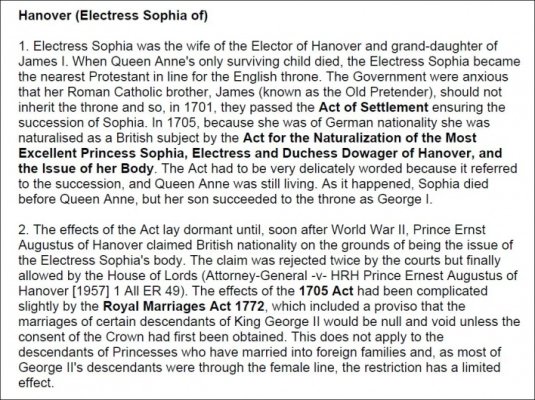Iluvbertie
Imperial Majesty
- Joined
- Jun 29, 2004
- Messages
- 14,459
- City
- Bathurst
- Country
- Australia
He didn't renounce his successsion rights totally. He agreed that his descendents would come below those of his younger brother's line.
I will take the British High Commission in Canberra's word on this - they sent out an information sheet on Prince Philip to their employees in 1947 and again in 1954 for their use when being asked questions by the general public about Philip and that information came from BP. It clearly stated that Philip was in line to both the Greek and Danish thrones as I have stated earlier - and the reason why as stated above.
I had those sheets for many years (as I stated in my earlier post) as my mother was an employee of the High Commission in 1947 and a friend of hers gave her copies from 1954 - the friend wasn't that interested in the royals and she knew that my mother was so she gave Mum all the information that was issued to High Commission employees in 1954.
For people who may not know the High Commission is the same as the Embassy but in Commonwealth countries we don't have Embassies with each other but High Commissions.
I will stick with the view given by Buckingham Palace - that Philip was in line to the Danish throne until 1953 - as was Charles.
I will take the British High Commission in Canberra's word on this - they sent out an information sheet on Prince Philip to their employees in 1947 and again in 1954 for their use when being asked questions by the general public about Philip and that information came from BP. It clearly stated that Philip was in line to both the Greek and Danish thrones as I have stated earlier - and the reason why as stated above.
I had those sheets for many years (as I stated in my earlier post) as my mother was an employee of the High Commission in 1947 and a friend of hers gave her copies from 1954 - the friend wasn't that interested in the royals and she knew that my mother was so she gave Mum all the information that was issued to High Commission employees in 1954.
For people who may not know the High Commission is the same as the Embassy but in Commonwealth countries we don't have Embassies with each other but High Commissions.
I will stick with the view given by Buckingham Palace - that Philip was in line to the Danish throne until 1953 - as was Charles.
Last edited by a moderator:





